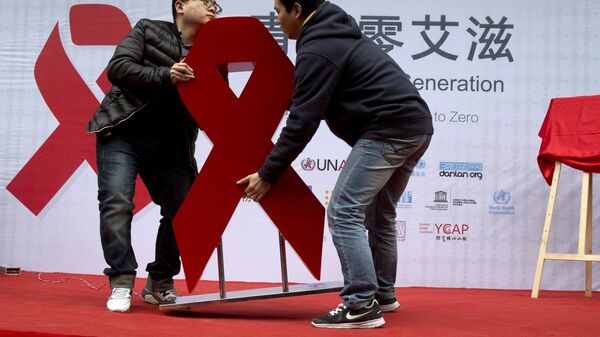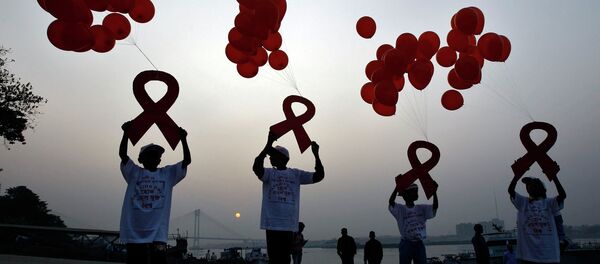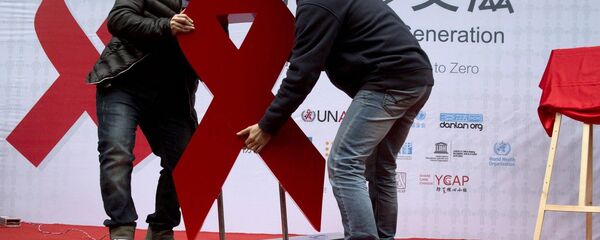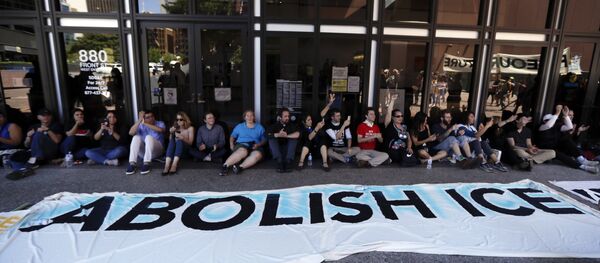In a pair of studies published Wednesday in the journals Nature and Nature Medicine, researchers found that antibodies taken from people whose bodies have an innate resistance to Human Immunodeficiency Virus (HIV), the infection that causes Acquired Immunodeficiency Syndrome (AIDS), and put into the bodies of people with HIV — both people taking and not taking antiretroviral drugs — could suppress the virus for up to 30 weeks at a time.
"A safe, reliable, antibody-based treatment regimen would open new possibilities for people living with HIV," Anthony Fauci, director of the National Institute of Allergy and Infectious Diseases in the US state of Maryland, told AFP Wednesday.
The studies were very small — seven patients in one, nine in the other — but the research "represents an important, early step towards that goal," he said.
The studies revolved around using two broadly neutralizing antibodies — 3BNC117 and 10-1074, discovered in 2011 and 2017, respectively — to neutralize HIV type 1. The antibodies, occurring in a tiny section of the population, target proteins on the outside of the virus from multiple angles, allowing the infected person's body to combat the infection itself.
In one experiment, nine HIV-positive patients stopped taking their daily antiretroviral drugs, instead receiving three infusions of the two antibodies over the course of six weeks.
In the other study, seven HIV-positive people who were not on antiretroviral drugs were given the same antibody infusions.
After that, the numbers of HIV viral cells counts in the subjects' blood "remained significantly reduced for three months following the first of up to three infusions," according to the study. Some patients' numbers remained suppressed for as long as 30 weeks.
"In addition, none of these individuals developed resistance to both antibodies," the study noted. One of the biggest problems that needs to be overcome by HIV treatments is the virus' tendency to adapt itself to drugs and become resistant to them over time.
"Both antiretrovirals and the antibodies are only effective against HIV-1 strains that are susceptible, so if someone has resistance already, or comes into contact with resistant viruses, the medications may not be effective," Dr. Anthony Moody, a researcher at Duke University in Durham, North Carolina, who wasn't involved in the studies, told Reuters in an email.
However, larger trials are needed to prove the viability of the immunotherapy as a treatment.
"If the larger trial with modified antibodies produces the expected results, they would be given once every six to nine months," Dr. Michel Nussenzweig, senior author of both studies and a researcher at the Howard Hughes Medical Institute at Rockefeller University in New York City, told Reuters via email on Wednesday.
"This is helpful for people who forget to take their pills," Nussenzweig wrote. "In addition, the antibody is a natural product cloned from a human being and… so far it has few detectable side effects."
"This has been tried in the past with antibodies that were far less potent, and it did not work," Nussenzweig told AFP. "Our idea is to modify them to make them even longer lasting so that people can receive therapy a couple of times a year instead of pills every day."
HIV attacks the immune system's white blood cells, which form the body's natural defense against illness. "A person is said to have AIDS when their immune system is too weak to fight off infection," Avert noted. "This is the last stage of HIV, when the infection is very advanced, and if left untreated will lead to death."
Earlier this year, a team of researchers at Hong Kong University's AIDS Institute reported discovery of a "functional cure" for HIV: an antibody that "works for all [versions of the virus]," Sputnik reported at the time. By a "functional cure," the researchers mean that the amount of the virus in the patient's bloodstream would be kept so low as to be undetectable, so long as patients keep getting regular injections of the antibody roughly four times a year. If patients stop taking the antibody, though, their symptoms could return as the virus proliferates through their body.
Present treatment for HIV is antiretroviral therapy or Pre-Exposure Prophylaxis (PrEP), which can effectively control the spread of the disease. One drug, Truvada, which became available in 2014, claims to be 99 percent effective at preventing HIV infection when taken daily, although a New York Times investigation into the claim suggested that number might be as low as 92 percent — which is still much, much better than zero. However, like the Hong Kong team's projected "functional cure," such drugs must also be taken regularly, in this case daily, in order to be effective.
Cuts to HIV Research Budget
The treatment studies come amid news that the Trump administration plans to use millions of dollars allocated for research into deadly diseases such as a HIV and different cancers to plug holes in the swelling budgets for immigrant detention centers.
In a September 5 letter signed by Department of Health and Human Services (DHHS) Secretary Alex Azar to Senator Patty Murray (D-WA), the secretary outlined plans to move $266 million from several research programs to the Unaccompanied Alien Children (UAC) program, which administers the government's system of child immigrant detention centers, according to Yahoo News, which obtained and published the letter last week.
Among the budget reallocations is a $5.7 million cut from the Ryan White HIV/AIDS program, which provides funding for HIV health care and support services. HHS has already redirected $17 million from Ryan White to UAC.
Other program cuts include $16.7 million from the Centers for Disease Control and Prevention (CDC), including $3.8 million dedicated to the prevention of HIV/AIDS, hepatitis, tuberculosis and sexually transmitted diseases, as well as $9.8 million from Medicare and Medicaid program operations and $13.3 million from the National Cancer Institute, Pink News reported.
An HHS spokesperson told Politico at the time that the funds were "unused and unobligated" and did not affect the Ryan White program's work.
"If there's leftover money from Ryan White, it should go to support programs for poor people with HIV and AIDS, not this outrageous separation policy," Emily Holubowich, executive director of the Coalition for Health Funding, told Politico.
The budget reductions came as the CDC released a new report on September 21 finding that "among 236,150 [men who have sex with men (MSM)] with HIV infection diagnosed during 2008-2016, a total of 106,258 (45 percent) were aged 13-29 years."






